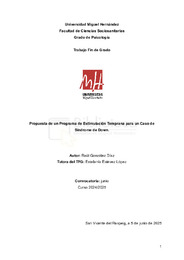Por favor, use este identificador para citar o enlazar este ítem:
https://hdl.handle.net/11000/36945Registro completo de metadatos
| Campo DC | Valor | Lengua/Idioma |
|---|---|---|
| dc.contributor.advisor | Estévez López, Estefanía | - |
| dc.contributor.author | González Díaz, Raúl | - |
| dc.contributor.other | Departamentos de la UMH::Psicología de la Salud | es_ES |
| dc.date.accessioned | 2025-07-25T12:08:45Z | - |
| dc.date.available | 2025-07-25T12:08:45Z | - |
| dc.date.created | 2025-06 | - |
| dc.identifier.uri | https://hdl.handle.net/11000/36945 | - |
| dc.description.abstract | El presente Trabajo de Fin de Grado tiene como finalidad diseñar un programa de estimulación temprana dirigido a una niña de 4 años diagnosticada con Síndrome de Down. Esta condición genética conlleva alteraciones en el desarrollo motor, cognitivo, del lenguaje y socioafectivo, lo que requiere una intervención especializada desde los primeros años de vida. La propuesta se estructura en torno a un conjunto de actividades organizadas en ocho sesiones distribuidas durante un mes, integrándose dentro del marco de intervención del Centro de Desarrollo Infantil y Atención Temprana (CDIAT) San Vicente del Raspeig. Las actividades han sido diseñadas con un enfoque lúdico, adaptado y personalizado, atendiendo a las características individuales de la menor, sus intereses y el contexto familiar. El programa pretende complementar las intervenciones ya recibidas por la niña (logopedia y estimulación) y favorecer el desarrollo de habilidades clave mediante una metodología activa y centrada en la niña. Además, se contempla la participación de la familia como agente clave en la generalización de los aprendizajes. Se espera que esta propuesta contribuya a mejorar la autonomía y calidad de vida de la menor, y aporte un ejemplo práctico aplicable en contextos reales. | es_ES |
| dc.description.abstract | This Final Degree Project aims to design an early stimulation program for a 4-year-old girl diagnosed with Down syndrome. This genetic condition involves developmental delays in motor, cognitive, language, and socio-emotional areas, which require specialized intervention from early childhood. The proposed program consists of a set of structured activities divided into eight sessions over one month, developed within the framework of the Early Childhood Development and Early Intervention Center (CDIAT) in San Vicente del Raspeig. The activities are designed to be playful, adaptive, and personalized, taking into account the child’s individual characteristics, interests, and family context. The program complements the speech therapy and stimulation sessions the child already receives and seeks to promote key skills through an active, child-centered methodology. Additionally, the active involvement of the family is encouraged to support the generalization of learning. This intervention is expected to enhance the child’s autonomy and quality of life while offering a practical model that can be applied in real-world early care settings. | es_ES |
| dc.format | application/pdf | es_ES |
| dc.format.extent | 28 | es_ES |
| dc.language.iso | spa | es_ES |
| dc.publisher | Universidad Miguel Hernández de Elche | es_ES |
| dc.rights | info:eu-repo/semantics/openAccess | es_ES |
| dc.rights | Attribution-NonCommercial-NoDerivatives 4.0 Internacional | * |
| dc.rights.uri | http://creativecommons.org/licenses/by-nc-nd/4.0/ | * |
| dc.subject | Síndrome de Down | es_ES |
| dc.subject | estimulación temprana | es_ES |
| dc.subject | intervención individualizada | es_ES |
| dc.subject | desarrollo infantil | es_ES |
| dc.subject | atención temprana | es_ES |
| dc.subject | Down syndrome | es_ES |
| dc.subject | early stimulation | es_ES |
| dc.subject | individualized intervention | es_ES |
| dc.subject | child development | es_ES |
| dc.subject | early intervention | es_ES |
| dc.subject.other | CDU::1 - Filosofía y psicología::159.9 - Psicología | es_ES |
| dc.title | Propuesta de un Programa de Estimulación Temprana para un Caso de Síndrome de Down | es_ES |
| dc.type | info:eu-repo/semantics/bachelorThesis | es_ES |

Ver/Abrir:
TFG Raúl González Díaz.pdf
798,49 kB
Adobe PDF
Compartir:
 La licencia se describe como: Atribución-NonComercial-NoDerivada 4.0 Internacional.
La licencia se describe como: Atribución-NonComercial-NoDerivada 4.0 Internacional.
Herramientas de Administrador
.png)